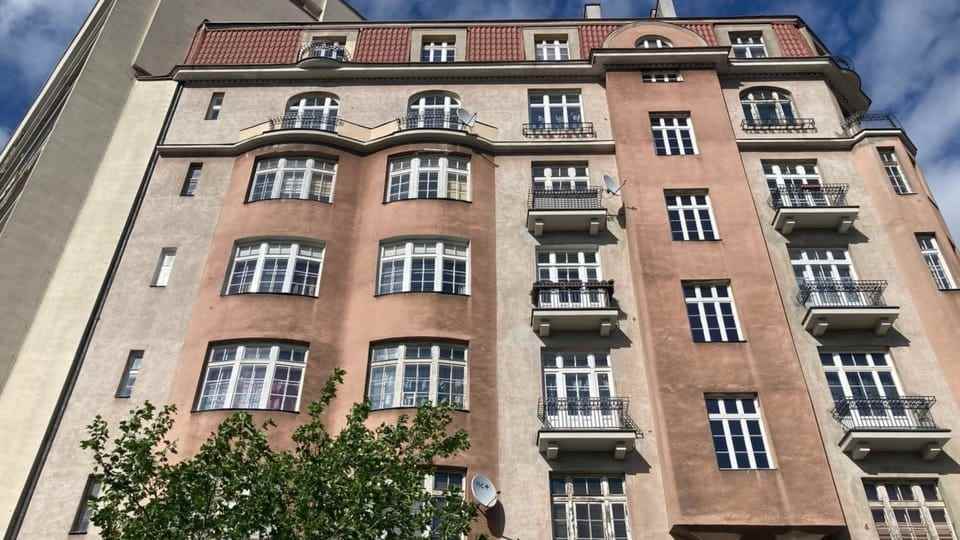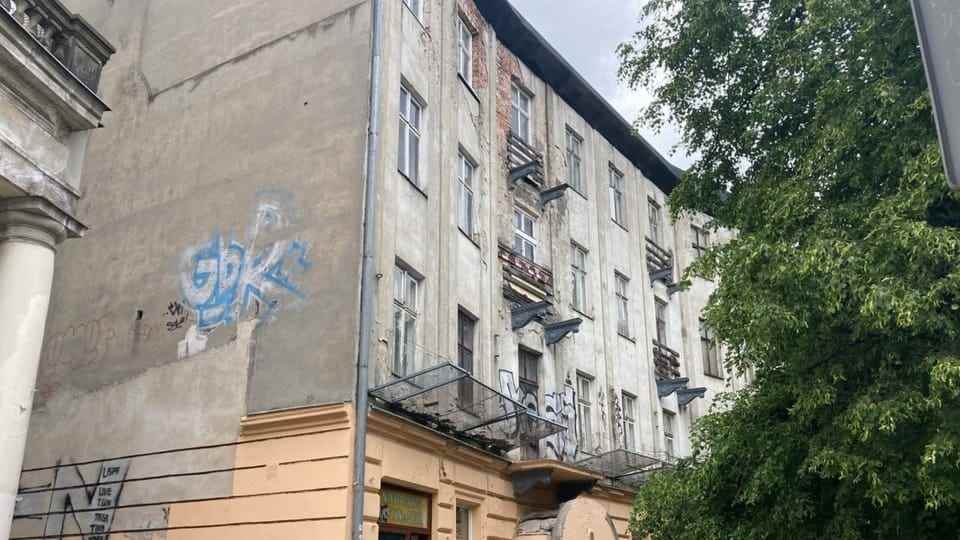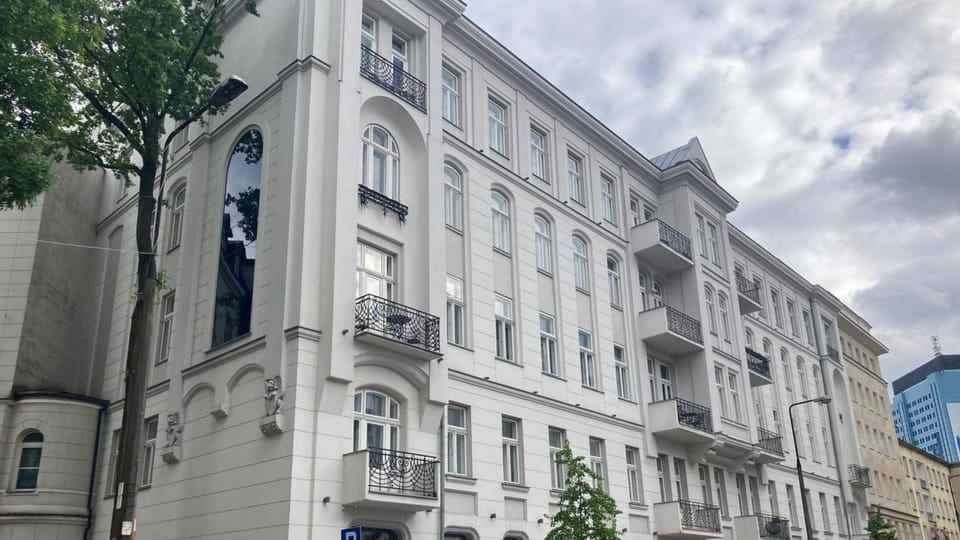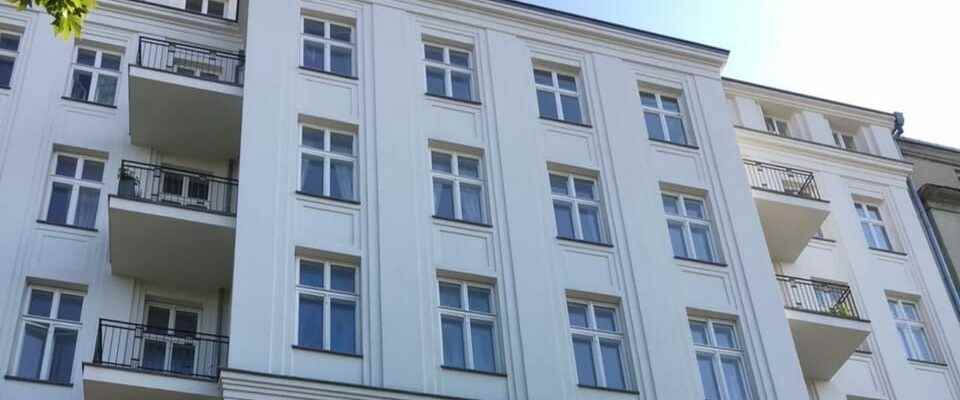Israel only recently had an ambassador in Poland again because of the war in Poland’s neighboring country Ukraine. Before that, Israel had withdrawn its envoy for months – out of anger. Anger that Poland is anti-Semitic for not giving back Jewish property.
The reason for this accusation is a law that makes it impossible for some heirs of Jewish landowners in Warsaw to reclaim their inheritance.
Lots of unclear ownership
In order to understand this, you have to know that the restitution of property is a big issue in Poland. Because so many people were murdered and dispossessed during and after the Second World War that there are unclear ownership relationships in many corners. Especially in Warsaw. An example of this is the magnificent white house that Jan Spiewak in the middle of the Polish capital.
Legend:
“I chose this house because it was stolen from its Jewish owners after the war,” says Jan Spiewak.
SRF
The Nazis laid the foundation for this theft in 1939: Right at the beginning of the Second World War, they bombed the city of Warsaw, and later they razed almost 90 percent of the buildings in the Polish capital to the ground. Before the war, hundreds of thousands of Jews lived in the city, only very few survived the Holocaust. And many non-Jewish Poles also fled or died.
After the war, the communists ruled – they had to build a whole new city. Of course they wanted to nationalize a lot anyway, regardless of the external circumstances, but in the case of Warsaw, the reconstruction would hardly have worked without nationalization. After all, each government would have needed a unified plan and land to resurrect the destroyed city.
The communist government decided: The 40,000 buildings – often ruins whose owners had disappeared – belong to the state. Anyone who wanted something back had time until the early 1950s to get in touch. And he had to have money to renovate and maintain the buildings. This deadline passed without many pre-war owners coming forward.
No law on compensation in Poland
But in 1989, after the end of communism, many previous owners wanted their property back – or at least compensation. Unlike other former Eastern Bloc countries, Poland had no law for these cases. And so began the heyday of speculators in the 1990s: the state privatized land and buildings without rules, it was easy to get something, often thanks to forged documents and bribed Warsaw officials.
“A crazy time,” says politician Jan Spiewak. After the war, kindergartens, schools and parks were created. After 1989 quite a few had to give way because someone claimed the property for themselves. Often a rightful heir, but sometimes not.

Legend:
Many beautiful Warsaw houses have unclear ownership.
srf
After the Second World War, a criminal gang snatched the gleaming white house Jan Spiewak took us to with forged documents and sold it. But the real, Jewish owners had survived the war and were complaining. The gang ended up in jail, but the old owners still couldn’t get their house back because of formalities. It was nationalized instead.
After the fall of communism in democratic Poland, the buyer who had bought it from the criminals after the war demanded it back – even though he knew that his purchase had been unlawful at the time. He got the house. That was a scandal that Jan Spiewak was one of the first to publicize. Because the buyer was the uncle of the husband of the then Mayor of Warsaw.
A few meters further on our city walk we come to a square with many cafés, with a lot of life. In the middle, however, a gray building is slowly falling apart. You see something like this surprisingly often in the best locations in Warsaw. That happens, says Jan Spiewak, when the wrong people get buildings. “If ownership is so unclear that nobody buys the building from them, they just let it fall apart.”

Legend:
It is often unclear who owns the ruined buildings in the middle of Warsaw.
SRF
One street further is another perfectly renovated town house that was privatized after the end of communism in Poland. Jan Spiewak says it was – like so many others – sold well below market value. All tenants were thrown out.
Then came the luxury conversion. In the meantime, heads of media companies and diplomats lived in the beautiful apartments. “In my opinion, that shows how big the role of corruption has been in many privatizations,” says Spiewak.

Legend:
This building was privatized, sold cheaply and then rebuilt.
SRF
In 2015, however, the wave of privatizations in Warsaw came to an end: the conservatives replaced the liberals in power. There were commissions of inquiry, court decisions – and a new law. After 30 years, it says, decisions by Polish authorities on the nationalization of property – even questionable ones – can no longer be challenged.
The idea is that nobody should claim schools or parks for themselves after decades, possibly with forged documents. Politician Jan Spiewak likes that. “Only the current government had the power to tell all the lawyers in nice suits to get out of their way.”
outrage in Jewish circles
Politicians in Israel and the United States are now outraged: it’s anti-Semitic, since Holocaust survivors can no longer claim back their belongings. But the Jew Spiewak says: The new law applies to everyone. In fact, it may affect far more Poles than Jews, simply because there were more Poles than Jews in Warsaw before the war. Jan Spiewak also thinks: “You can’t hurt someone today to compensate people who lost something 70 years ago.”
The critics of the law say: You can’t withhold property from families that the Nazis and communists took everything away from them. In any case, this story shows that justice is almost impossible after such a long time.


